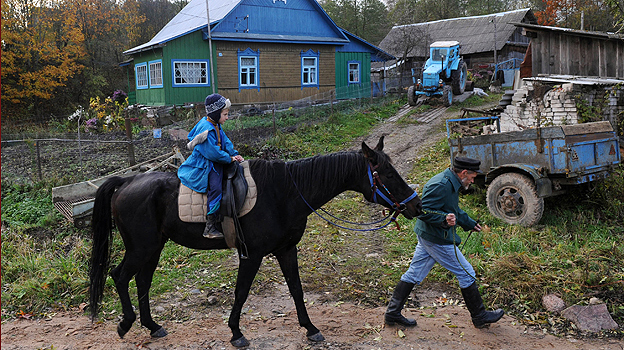Belarus profile

The present borders of Belarus were established during the turmoil of World War II.
The former Soviet republic was occupied by the Nazis between 1941 and 1944, when it lost 2.2 million people, including most of its large Jewish population.
There are about 400,000 ethnic Poles living in the west of the country.
It has been ruled with an increasingly iron fist since 1994 by President Alexander Lukashenko. Opposition figures are subjected to harsh penalties for organising protests.
In early 2005, Belarus was listed by the US as Europe's only remaining "outpost of tyranny". In late 2008, there were some signs of a slight easing of tensions with the West, though this proved to be only a temporary thaw.
The country became independent in 1991, following the collapse of the Soviet Union.
 Belarus was one of the more prosperous parts of the old Soviet Union but its fortunes have since declined
Belarus was one of the more prosperous parts of the old Soviet Union but its fortunes have since declined
Two decades later, the sense of national identity is weak, international isolation continues and the nature of political links with Russia remains a key issue.
In the Soviet post-war years, Belarus became one of the most prosperous parts of the USSR, but with independence came economic decline. President Lukashenko has steadfastly opposed the privatisation of state enterprises. Private business is virtually non-existent. Foreign investors stay away.
The economic situation deteriorated drastically in the summer of 2011 when a balance of payments crisis drained the country's hard-currency reserves. The government's efforts to re-peg the official exchange rate and freeze the price of staple foodstuffs failed to impress either Russia or the International Monetary Fund, to both of which Belarus appealed for assistance.
At a glance
- Politics: President Lukashenko is seen as "Europe's last dictator". He's been in power since 1994
- Economy: Soviet-style economy is considered to have been subsidised by cheap Russian gas
- International: A key oil and gas pipeline from Russia to Europe runs through Belarus
Country profiles compiled by BBC Monitoring
For much of his career, Mr Lukashenko has sought to develop closer ties with Russia. On the political front, there was talk of union but little tangible evidence of progress, and certainly not toward the union of equals envisaged by President Lukashenko.
Belarus remains heavily dependent on Russia to meet its own energy needs and a considerable proportion of Russian oil and gas exports to Europe pass through it.
Russia's role as a major energy supplier to the rest of Europe and Belarus's position as a key transit country have come under the spotlight several times since 2006, when tensions first arose between Moscow and Minsk over the price of Russian gas and Belarus's privileged access to duty-free oil.
Relations with Russia deteriorated sharply in the summer of 2010, with disputes over energy pricing, customs union terms and the presence in Belarus of ousted Kyrgyz president Bakiyev, prompting speculation that Moscow might switch support from Lukashenko to another leadership candidate.
 Belarus became independent in 1991, after the collapse of the Soviet Union
Belarus became independent in 1991, after the collapse of the Soviet Union


 Greek PM to reveal new cabinet
Greek PM to reveal new cabinet Syria jet pilot defects to Jordan
Syria jet pilot defects to Jordan Art of rejection
Art of rejection The cult of TED
The cult of TED Changed by Bali
Changed by Bali Through a lens
Through a lens Alan Turing: Man and myth
Alan Turing: Man and myth Talking Movies
Talking Movies